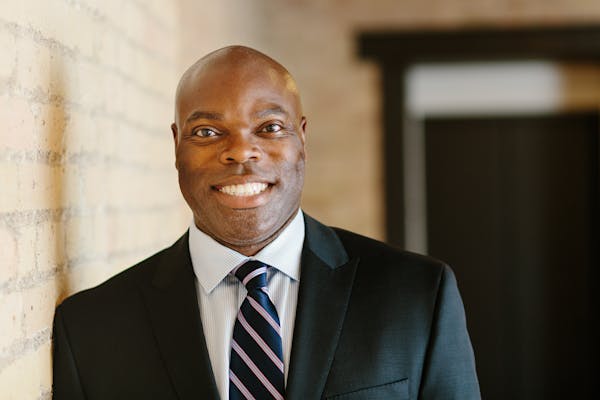Kassius Benson, the former Hennepin County chief public defender who resigned amid a federal probe that yielded tax evasion charges, received a three-year probation sentence Wednesday in U.S. District Court in Minneapolis.
Benson, 53, of Plymouth, admitted in December that he failed to pay taxes withheld for employees at his Minneapolis-based criminal defense firm, Kassius Benson Law, before taking his public job in January 2021. As part of his plea deal, Benson must pay the Internal Revenue Service $213,591.81 in restitution. U.S. District Judge John Tunheim on Wednesday added a requirement that Benson complete three weekends of incarceration in a community confinement facility within his first year of probation.
"You have some big mountains to climb now, particularly with your license. This has been surprising to all of us given the good work you've done in this court," said Tunheim. "I encourage you to decide you want to be that role model again."
Benson, whose nearly four dozen federal clients included a woman charged with identical tax crimes at the same time committed his, was indicted on 17 counts related to federal tax evasion in February 2023. He pleaded guilty to one count of failure to account for and pay over payroll taxes, while the remaining charges were dropped.
Benson told Tunheim Wednesday that he harbored ambitions of practicing law as early as when he was in sixth grade. He started out as a law clerk in the county office after he graduated from the University of Minnesota Law School in 1996. He worked as a public defender here and in Washington, D.C., before launching his own Minneapolis-based firm 20 years ago. At his private firm, Benson employed at least five people in 2013 and again from 2015-2019, and failed to file proper quarterly forms and turn over taxes he withheld during that stretch. As the sole shareholder, he was responsible for the collection and payment of employment taxes and for filing the appropriate quarterly IRS forms.
A revenue agent began an audit relating to forms that Benson was to have filed in 2017. The agent expanded the investigation to 2013 and 2015-2019 upon finding that Benson had failed to pay employment taxes, unemployment taxes and to file the forms.
The state Board of Public Defense hired Benson to lead the Hennepin County Public Defenders Office just six months after the IRS lodged its probe into his firm in July 2020. As chief public defender, he received a $145,288 salary and oversaw 200 employees. His resignation in October 2022 came just two days after Wayzata police cited him for drunken driving.
According to court filings, Benson held onto the employment taxes withheld from his employees' paychecks from 2013 to 2019. In October 2020, he filed a joint 2019 U.S. Individual Income Tax Return that falsely claimed a credit for withholdings from his own wages. The restitution amount Benson is ordered to pay the IRS aligns with what he admitted to keeping.
Prosecutors from the Justice Department's Tax Division called for an eight-month prison sentence while Benson's attorneys argued for probation. Christopher Lin, one of the two prosecutors who led the government's criminal case, said Benson had the means to pay what his firm owed the government during the course of his crimes and that he had the chance to make good when the IRS auditor first contacted him in 2020.
"If he had the outstanding character he says he has in his pleadings he would've knocked that opportunity out of the park," Lin said.
Instead, Lin argued, Benson stole government funds to build his reputation and bolster his legal practice.
"No public defender's office would've chosen him to lead it if he couldn't run a four-person law firm without running it into the ground," Lin said.
Edward Ungvarsky, one of three attorneys who say they volunteered to represent Benson, argued that the case was more a reflection of Benson's poor skills at managing a business than an intent to commit wrongdoing. Ungvarsky said Benson put off his obligations to pay taxes in lieu of caring for his family and clients. Benson was in denial about the problems his firm faced, he said, and he put his head down and focused on its work.
"He was running a firm and making a giant mistake and the hole got deeper and deeper," Ungvarsky said.
He described the case as a high-profile cautionary tale about the fall of a lawyer to felon, from legal practitioner to unemployed. Benson threw away a quarter-century career and demolished a dream he clung to since he was a child, Ungvarsky said.
Benson now lives in Plymouth and is still senior counsel and lead trial lawyer at his private firm that lists no other employees on its website. His sentencing is likely to lead to a law license suspension of some sort.
Benson was greeted after sentencing by a cadre of legal colleagues there to support him, including State Public Defender Bill Ward. Benson and his attorneys declined to comment after the hearing.
Standing before Tunheim, Benson apologized to the Minnesota Board of Public Defense and to his family. He vowed to make good on the restitution ordered in the case and said he believed he could still earn a substantial salary while working as a paralegal or investigator while he works to regain his law license. Tunheim added 120 hours of community service to Benson's sentence, suggesting he volunteer to speak in front of lawyer groups or students.
"It has registered, the damages that I've done; tarnishing what I built," Benson said. "My biggest regret is the effect this has had on my family and friends."
Star Tribune staff writers Kim Hyatt and Rochelle Olson contributed to this story.

House approves minimum pay for Uber and Lyft drivers, Senate vote pending

As bird flu spreads to dairy cows, Minnesota's raptors show signs of building remarkable immunity

Minnesota legislators headed toward chaotic and partisan finish of 2024 session

Como Park's stinky corpse flower could bloom anytime. Here's how to watch.


